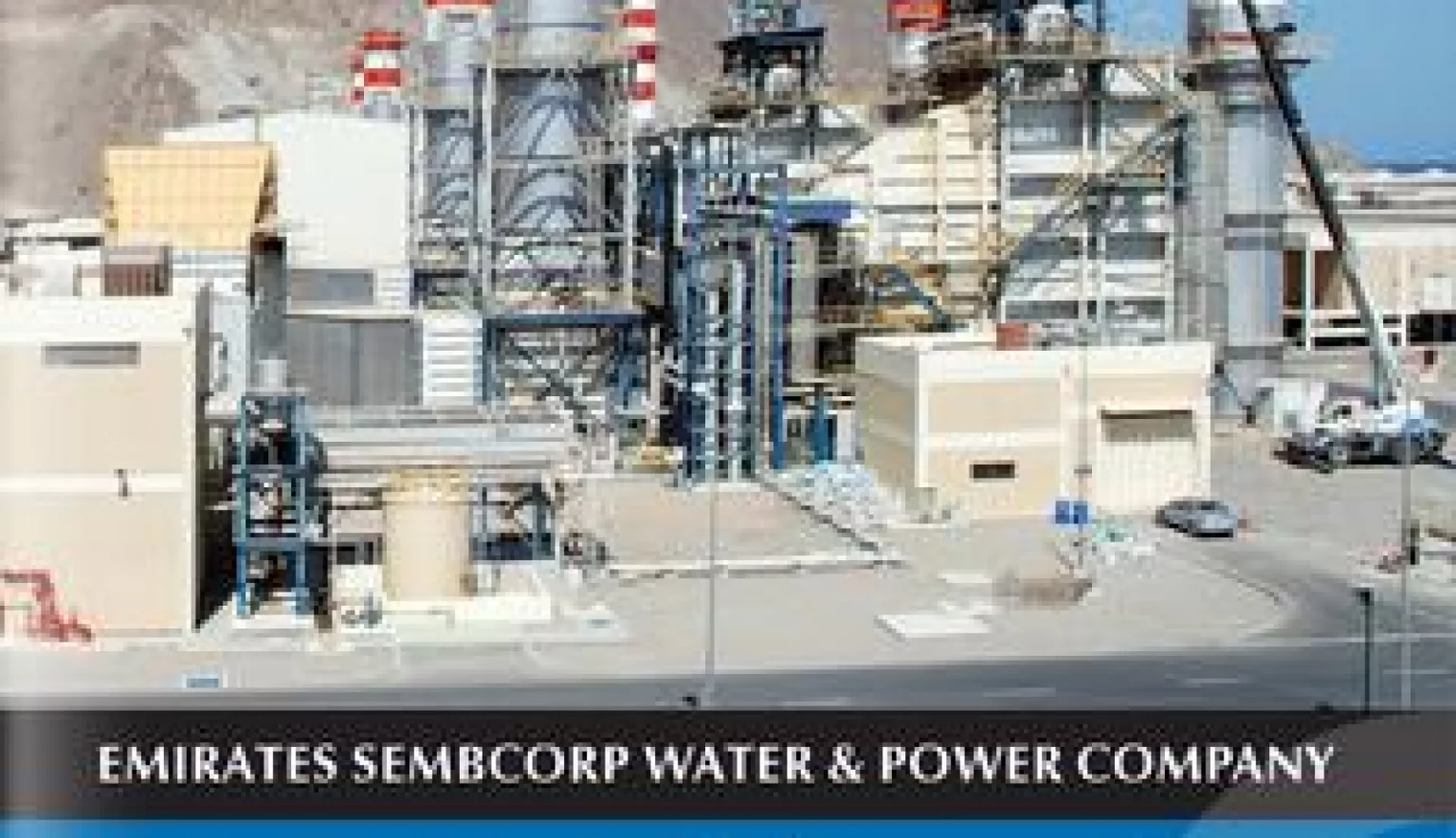Emirates Sembcorp Water & Power Company (ESC) has taken on the responsibility of meeting water and power demands in the Abu Dhabi Emirate for the best part of 10 years through a series of expansions and innovations, to ultimately create one of the world’s largest operating hybrid desalination plants.
MEETING RISING DEMANDS WITH RISING CAPACITIES
Taking ownership of the Fujairah Independent Water & Power Plant in 2006, ESC inherited not only one of the most pivotal projects in the region’s utilities and energy domain, but it took on a project that had already been in the development stage for five years previously; making the initial smoothness of the transition all the more important.
“In 2001, the Fujairah Water & Power Plant was established to meet the rising demand for water in the Abu Dhabi Emirate and the growing power needs of the Northern Emirates,” recalls ESC’s Commercial and Technical Director, Abdelhadi Alhammadi. “The Plant was originally owned by Union Water and Electricity Company (UWEC) and was successfully commissioned in June, 2004.
“In 2006, as a result of privatisation organised by Abu Dhabi Water & Electricity Authority (ADWEA), the plant was acquired by ESC, a joint venture between ADWEA and Sembcorp Industries (Sembcorp). The plant was the sixth power and water project in the UAE to be privatised by ADWEA and was then renamed Fujairah 1 Independent Water & Power Plant (F1 IWPP).”
The subsequent nine years have seen not just a continuation of the initial work being carried out under the site’s objectives, but have witnessed an even stronger drive towards creating an efficient, reliable, sustainable, safe and environmentally-friendly resource for the region; in-keeping with the core values dictated by the Plant’s shareholders – Abu Dhabi National Energy Company, ADWEA and Sembcorp Industries – and, by proxy, its operators, Sembcorp Gulf O&M Company (SGOMC).
ADDITIONAL OUTPUT
The competitive bidding process that began in 2005 is evidence not only of the significance of the project itself, but of Sembcorp’s capabilities and business structure that led it to be so successful in attaining F1 IWPP.
Much of its pulling factor as a bidder came down to its strong operating track record and ability to capitalise on its technical expertise in managing power and water facilities. Expansion plans for the project itself were soon put into place following the acquisition’s completion in 2006.
“The Plant had a net capacity of 534 megawatts (MW) of power and 100 million imperial gallons a day (MIGD) of water in June, 2004,” Alhammadi says. “The acquisition also included an expansion of the generation capacity of the facility by a further 225 MW, and in March, 2009 the expansion was successfully completed and the net power capacity was increased to 760 MW.”
As water demand in the Northern Emirates and Abu Dhabi has continued to grow ever since, the next stage of ESC’s expansion plan for F1 IWPP commenced in 2013, addressing the Plant’s seawater desalination capacity with an increase of 30 MIGD, taking the total capacity to 130 MIGD.
Alhammadi continues: “This additional output will be produced using reverse osmosis and the expansion will make the F1 IWPP one of the largest reverse osmosis desalination facilities in the Middle East.
“The F1 IWPP’s key business is to produce reliable power and water, and supply them to our customers’ respective networks for further distribution. At present, it has an installed power capacity of 893 megawatts and a seawater desalination capacity of 100 MIGD, with an additional 30 MIGD under development.”
INNOVATIVE FEATURES
Employing a combination of multi-stage flash and reverse osmosis membrane technologies, the two prerequisites of being one of the largest global operating hybrid desalination plants, and being the regional leader in reverse osmosis desalination are testament not only to ESC’s vision and ambitions for the Plant, but also to its commitment to innovation.
Alhammadi explains: “The most notable innovation and technology featured in the F1 IWPP comes from the seawater reverse osmosis expansion project. Apart from the expansion of the plant’s desalination capacity from 100 MIGD to 130 MIGD, the project also includes the adoption of a number of innovative features that improve energy efficiency and reduce the environmental impact of the plant.
“First is its ability to recover seawater discharge from the existing multi-stage flash facility for reuse as part of the seawater feed for reverse osmosis. This will not only reduce the amount of fresh seawater intake required, but also reduce the amount of power needed for reverse osmosis due to the higher temperature of the seawater feed from the multi-stage flash facility.”
From an environmental perspective, brine discharge from the Plant is also being minimised to reduce the negative impact of salinity changes on aquatic flora and marine life.
“Next, the expansion includes the installation of a new dissolved air floatation system which will provide enhanced pre-treatment of seawater feeding into the reverse osmosis plants,” Alhammadi adds. “This system enhances the reliability and availability of the reverse osmosis facility, particularly during red tide or algae bloom season.
“Lastly, the plant is also designed keeping in mind the varying power load demand as this varies a lot between the winter and summer seasons, although water demand remains fairly constant throughout the year.”
Through this, ESC is capable of producing an increased water output even with relatively low power demand, set up to cater for varying requirements across its jurisdiction.
AVAILABILITY, RELIABILITY, SAFETY
Since the acquisition, and in line with the ongoing capital investments being instilled into F1 IWPP, the Plant has achieved impressively high availability records as well as ISO 14001, OHSAS 18001 and Abu Dhabi Environmental Health and Safety Management System (EHSMS) certifications.
An additional DuPont STOP (Safety Training Observation Programme) introduced to enhance safety awareness and encourage employee collaboration further epitomises this dedication to sustainability and longevity; embracing what Alhammadi states as the Company’s most important assets, its people.
“ESC’s priority and focus is to ensure that we hire the right people and continuously invest in skill and competency development of our staff,” he says. “Staff performance is monitored on an ongoing basis and tailored training programmes are regularly implemented for relevant staff depending on the requirement and the areas of skill improvement required.
“We consider all our staff as part of the F1 family and promote an open and conducive work environment.”
Encouraging high levels of localisation across both its staff and supply chain is another philosophy engrained in ESC’s long-term vision as it looks to further leverage one of the region’s most exciting sectors via one of the region’s most important facilities.
Alhammadi concludes: “The F1 IWPP brings together the technological knowledge and operational track record of ESC’s ultimate joint venture partners – Sembcorp Industries and ADWEA – with the aim to marry the rising need for water in the region with environmental protection.
“Our focus is to ensure that the plant continues to achieve high availability, reliability and process safety, and meet all required potable water quality standards, while we will continue to look at areas we can further improve in terms of plant performance and overall efficiency.”




















